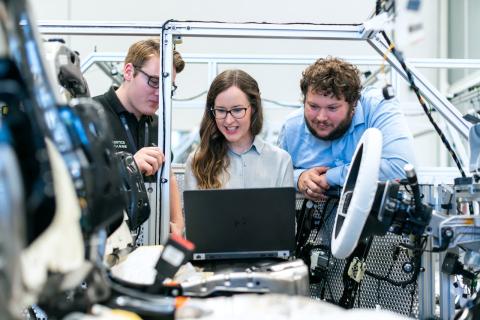Today, the automotive industry faces unprecedented challenges in an increasingly digitalized environment. Digital transformation is not just an option; it is a necessity to stay competitive in an ever-evolving global market. In this context, dynamic websites are presented as an indispensable solution for automotive companies seeking to improve customer experience, optimize internal processes, and maximize their business results.
What is a Dynamic Website?
A dynamic website is one whose content is generated in real-time, adapting to user interactions, data received from other sources, or a combination of both. Unlike static websites, where the content is fixed and does not change, dynamic sites can display personalized and updated information instantly. This is achieved by using advanced technologies such as databases, application servers, and programming languages such as JavaScript, PHP, Python, among others.

Advantages of Dynamic Websites in the Automotive Industry
Personalization of the user experience
One of the main benefits of dynamic websites is their ability to offer a personalized experience to each visitor. In the automotive industry, this translates into the possibility of displaying specific car models, configurations, and offers based on the user's browsing history or previous preferences. For example, if a customer has shown interest in electric vehicles, the dynamic website can prioritize the presentation of these models, increasing the likelihood of conversion.
Real-time inventory and pricing updates
For automotive companies, keeping inventory and pricing information up-to-date is crucial. Dynamic websites allow for integration with internal inventory management systems, ensuring that the data presented on the site is always accurate and current. This not only improves customer transparency and trust but also reduces the manual workload associated with constantly updating information.
Advanced interaction and customer support
The integration of chatbots and automated customer support systems is another significant advantage. AI-powered chatbots can offer immediate assistance, answering frequently asked questions, guiding users through the purchasing process, or scheduling appointments for maintenance services. These functionalities improve the customer experience by providing faster and more efficient service.
Data Analysis and Continuous Improvement
Dynamic websites are designed to collect and analyze data on user behavior in real-time. This information is invaluable for automotive companies, as it allows them to identify behavioral patterns, customer preferences, and areas for improvement on the website. By using web analytics tools, such as Google Analytics, companies can make informed decisions that continuously optimize the user experience and ultimately increase sales.

Key Technologies for Dynamic Websites in the Automotive Industry
Content Management Systems (CMS)
CMSs, such as WordPress, Drupal, or Joomla, allow companies to efficiently manage and update their website content. For the automotive industry, CMS can be customized to handle complex product catalogs, integrate inventory systems, and facilitate the creation of digital marketing-oriented content.
API and Microservices Integration
API (Application Programming Interface) integration allows dynamic websites to connect with other platforms and services. For example, an API can facilitate integration with third-party platforms for automotive credit validation, insurance quote, or used vehicle background checks. Microservices, on the other hand, allow applications to be broken down into smaller, more manageable services, which improves website scalability and flexibility.
Artificial Intelligence and Machine Learning
AI and machine learning are revolutionizing dynamic websites in the automotive industry. These technologies can predict user preferences, optimize marketing campaigns, and offer personalized vehicle and service recommendations. In addition, AI can automate business processes, such as customer service or inventory management, freeing up resources and improving operational efficiency.
Advanced Web Security
Since dynamic websites handle a lot of sensitive data, such as personal customer information and financial transaction details, security is a primary concern. Automotive companies must implement advanced security measures, such as SSL encryption, multi-factor authentication, and firewalls, to protect their websites from cyber threats.

Success stories in implementing dynamic websites
A prominent example is Ford Motor Company, which has implemented a dynamic website globally to offer a highly personalized user experience. Ford's website uses technologies such as AI and big data to analyze user preferences and present relevant content, from vehicle configurations to region-specific promotions.
Another case is Tesla, which has developed a highly interactive, dynamic website that not only displays detailed information about its vehicles but also allows users to customize and order their vehicles in real-time, integrating the purchasing process into a completely digital experience.
Future of Dynamic Websites in the Automotive Industry
As technology advances, dynamic websites will continue to evolve, offering even more sophisticated capabilities. The integration of emerging technologies, such as augmented reality (AR) and virtual reality (VR), is expected to transform the way consumers interact with automotive brands online. Imagine being able to “test drive” a vehicle virtually, exploring every detail from the comfort of your home, before deciding to make a purchase.
Dynamic websites represent an essential tool for companies in the automotive industry looking to stay competitive in an increasingly digital marketplace. By providing a personalized user experience, keeping the information updated in real time, and utilizing advanced technologies such as AI and machine learning, these websites can make a significant difference in attracting and retaining customers.
Additionally, with the right security and a continuous improvement strategy based on data analysis, dynamic websites can be a key driver for growth and innovation in the automotive sector.
At Rootstack, we have over 14 years of experience creating these types of websites that can offer your clients a new image and optimal user experience. Trust our work.
We recommend you on video

